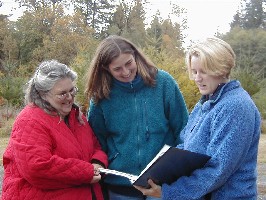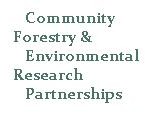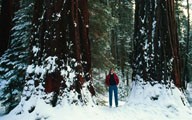|
2001 - 5th Annual CFERP Workshop - Oregon

The CFERP Program held its fifth annual workshop from October 6 to 9, 2001, at the Silver Falls State Park Conference Center near Sublimity, Oregon . The goals of the workshop were to help develop a broader understanding of the theoretical and substantive issues in community forestry among workshop participants, to provide training in participatory research methods, to provide networking opportunities, and to expand the institutional connections and networks of the CFERP program. That the workshop exceeded its goals was evident in the renewed energy and enthusiasm for community forestry that the participants carried away from the meeting with them.
Forty people attended the workshop including fellows, academic advisors, community representatives, steering committee members, and several invited guests. The latter were invited to expand the geographic reach of the CFERP network, to acquaint students who are likely prospects to become future fellows with the program, as well as to acquaint faculty at historically black colleges, or who otherwise might be likely to have contact with minority and underserved students, with the program. The invited guests included Rory Fraser (Alabama A&M University), Tony Cheng (Colorado State University), John Schelhas (Tuskeegee University), Ajit Krishnaswamy (National Community Forestry Center), Marshall Murphree (University of Zimbabwe), Jefferson Fox (East West Center, Honolulu), Halima O’Neil (student, California State University, Hayward), and Paige Fischer, Christina Kakoyannis, Du Ke, and Adam Wiskind all of whom are students at Oregon State University.
The workshop opened with a half day session on participatory research led by Pam Tau Lee of the Labor Occupational Health Program at the University of California at Berkeley. In addition to leading interactive exercises and discussions on participatory research, Ms. Lee described the participatory research she has conducted with members of the Hotel and Restaurant Employees Union on occupational health issues of hotel room cleaners. Ms. Lee’s presentation showed how workers can be trained to do research that both meets standards of academic rigor and provides useful information to labor unions for their collective bargaining efforts.
As always, the presentations by the fellows and their community partners were the focal point of the workshop. The 2001 presentations covered the full range of community forestry issues from riparian restoration on tribal lands to the role of a sense of place in mediating environmental conflicts; from the role of race, class and gender in shaping urban forests to issues of migrant laborers in the non-timber forest products industries; from the effects of different tenurial arrangements on harvesting of floral greens to issues in managing private forests across property boundaries on an ecosystem scale.
Recurring themes in the workshop included how to incorporate local knowledge into research, making research meaningful to the community, developing research questions that satisfy academic committees and address community needs and concerns, and the range of methods and approaches that could be considered participatory.
The workshop also included a field trip to a private forestland owner’s land, and an evening fireside group discussion with several members of the Oregon Small Woodland Owners Association. The field trip provided a first-hand view of the kinds of management occurring on the land of Oregon’s nonindustrial forestland owners, and the group discussion provided many insights into the motivations for action and feelings about the land that such forestland owners have.
|







